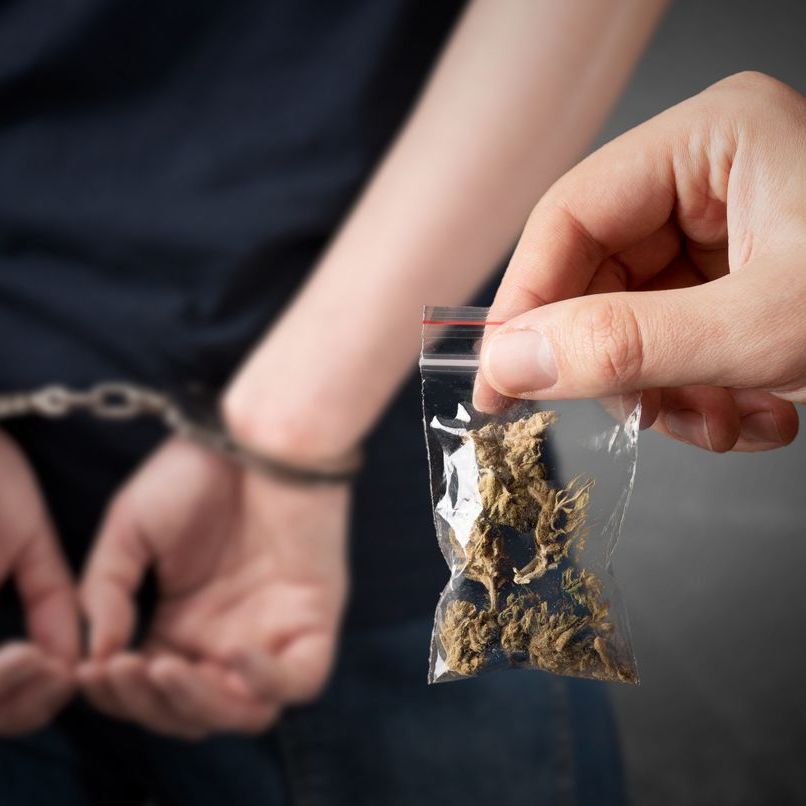Possession of marijuana is usually a Class B misdemeanor in Indiana, and you may be sentenced to up to six months in jail and a $1,000 fine. Additional penalties may apply if you have a prior conviction for a drug offense. You have no time to waste. Retain a possession of marijuana attorney in Indiana immediately.
Gemma & Karimi Law are aggressive, experienced drug possession defense attorneys who can develop a rigorous defense to this serious charge. Our attorneys are former state prosecutors and know how to create winning strategies to maintain your freedom and clean record. Speak to one of our experienced drug offense attorneys today in a free consultation at (317) 602-5970.
Possession of Marijuana Laws
In Indiana, marijuana possession remains illegal for both recreational and medical purposes as of 2025, with limited exceptions for certain cannabis-derived products. Current laws are as follows:
Basic Possession
Possessing any amount of marijuana is classified as a Class B misdemeanor. This carries a penalty of up to 180 days in jail and a fine of up to $1,000. This applies to pure or adulterated marijuana, hash oil, hashish, or salvia.
Enhanced Penalties with Prior Convictions
If you have a prior drug offense conviction and possess less than 30 grams of marijuana, the charge escalates to a Class A misdemeanor. This is punishable by up to 1 year in jail and a fine of up to $5,000.
If you have a prior drug offense conviction and possess 30 grams or more of marijuana, it becomes a Level 6 felony. This carries a penalty of 6 months to 2.5 years in prison and a fine of up to $10,000.
CBD Exception
Indiana law exempts CBD (cannabidiol) products with less than 0.3% THC from the definition of marijuana, making them legal to possess and sell if they comply with labeling and licensing requirements. This stems from the 2018 Farm Bill and Indiana’s Senate Bill 52, which legalized low-THC hemp products.
No Medical Marijuana Program
Unlike some neighboring states (e.g., Michigan, Illinois, Ohio), Indiana does not have a medical marijuana program. Even marijuana legally obtained in another state for medical use is illegal to possess in Indiana.
If you have a prior conviction for possessing marijuana. You will be charged with a Class A misdemeanor, carrying a maximum penalty of 365 days in jail and/or a $5000 fine. If you have a prior conviction for possessing marijuana and are found to possess more than 30g. In that case, the offense is enhanced to a Level 6 Felony, carrying a sentence of 6 months to 2 1/2 years and a maximum fine of $10,000.

Facing criminal charges in Indianapolis?
Call our Indianapolis Criminal Defense attorney at (317) 676-4747 or fill out our online contact form today to schedule a free consultation!
Defenses to Marijuana Charges
If you have been accused of possession of marijuana or paraphernalia, your criminal defense attorney in Indiana will review your case and consider these common defenses:
Illegal Search and Seizure
The Fourth Amendment protects against unreasonable searches and seizures. If law enforcement searched without probable cause, a valid warrant, or proper consent, any evidence obtained might be deemed inadmissible in court. For example, if police searched your car during a traffic stop without a legal basis and found marijuana paraphernalia, your drug defense attorney could argue that the search violated your constitutional rights, potentially leading to the suppression of evidence.
Lack of Possession
To convict someone of possession, the prosecution must prove the individual had actual or constructive control over the marijuana. Actual possession means it was on your person, while constructive possession implies you had the ability and intent to control it. If the marijuana wasn’t yours and you didn’t have control over it, say, it belonged to someone else in the vehicle, you could argue lack of possession.
Unlawful Stop or Arrest
Police must have reasonable suspicion to stop you or probable cause to arrest you. If the initial stop was unjustified or based on a hunch rather than specific facts, any evidence gathered afterward could be challenged. For instance, if an officer pulled you over without observing a traffic violation and then found marijuana, the stop itself might be deemed unlawful.
Entrapment
If the police officer induced you to commit a marijuana-related offense you wouldn’t have otherwise committed, entrapment could be a defense. This might apply in cases involving undercover agents pressuring someone into selling or possessing marijuana against their typical behavior. However, this defense requires proving the idea originated with the police officer, not you.
Insufficient Evidence
The prosecution must prove beyond a reasonable doubt that the substance was marijuana and that you knowingly possessed it. If the substance wasn’t adequately tested or identified, or if there’s doubt about your awareness of its presence, this could weaken the case against you.
Procedural Errors
Mistakes in handling the case, like improper evidence handling, failure to read Miranda rights when required, or errors in the chain of custody, could undermine the prosecution’s case. For example, if the marijuana wasn’t adequately documented or tested, its validity as evidence could be questioned.
Potential Consequences of Possession of Marijuana
While the national conversation about marijuana legalization persists, the reality in Indiana is clear: Possessing marijuana or drug paraphernalia remains illegal. If you’re facing charges for possessing either, the stakes are high, with potential consequences that could significantly impact your life. It’s crucial to consult an attorney who will protect your rights and guide you through the process.
A conviction for possessing marijuana or paraphernalia in Indiana could lead to penalties such as jail time, probation, steep fines and court costs, as well as long-term effects like diminished job or housing prospects, ineligibility for federal financial aid, a suspended driver’s license, or even immigration issues if you’re not a U.S. citizen.
Always retain a skilled attorney in Indiana if you are arrested for possession of marijuana. Your attorney will defend your rights and fight for the ideal case outcome.

Conditional Release and Expungement
Conditional release typically refers to a court-ordered deferral of a criminal conviction, often paired with probation-like conditions, allowing a defendant to avoid a formal conviction if they comply with specific terms. In the context of marijuana charges, Indiana offers a mechanism known as a conditional discharge. This applies specifically to first-time offenders charged with possession of marijuana as a misdemeanor.
If a person has no prior drug convictions and pleads guilty to misdemeanor marijuana possession, the court may, with the defendant’s consent, defer entering a judgment of conviction. Instead, the individual is placed under court supervision with conditions such as probation, drug treatment, community service, or fines. If the conditions are met, the case is dismissed without a conviction.
Expungement in Indiana
Expungement in Indiana allows individuals to seal or remove certain criminal records from public view, offering a “second chance” to move past prior legal issues. Depending on eligibility, this process can apply to arrests, charges, and convictions.
Non-Conviction Records
- For arrests or charges that didn’t result in a conviction (like a completed conditional discharge), expungement is relatively straightforward:
- You must wait one year from the date of arrest or filing of charges.
- There must be no conviction or juvenile adjudication, pending charges, or current participation in a pretrial diversion program.
- If granted, the record is sealed from public access, though law enforcement and certain agencies may still see it.Conviction Records
- For misdemeanor convictions, expungement is possible after:
- Five years from the conviction date for misdemeanors, provided no new convictions occur, all fines and fees are paid, and no charges are pending.
- For low-level felonies (Class D or Level 6), the wait is eight years from the conviction date, with similar conditions.
- More serious felonies require longer waiting periods and, in some cases, prosecutor consent with discretionary approval by the court.
Now What? Steps to Take After Being Charged For Possession of Marijuana
You were arrested for possession of marijuana, marijuana plants, or paraphernalia possession. What should you do? First, speak minimally to the police, other than to identify yourself and where you live. Then, call a highly respected criminal defense attorney to defend your rights and freedoms.
Our criminal defense lawyers in Indianapolis have 25 years of experience in marijuana and paraphernalia possession cases. They will immediately investigate your felony charge and understand the marijuana possession charges against you. Then, they will craft a formidable defense with a goal of case dismissal. Pre-trial diversion may be possible, which allows for a reduced sentence or even a case dismissal.
Gemma & Karimi were prosecutors and are now highly respected criminal defense lawyers. They know all sides of the Indiana criminal justice system. When you hire us, we are available for calls 24/7. Contact our possession of marijuana attorney in Indiana for a free consultation at (317) 602-5970.

Frequently Asked Questions
If you are arrested, exercise your right to remain silent immediately. Do not attempt to explain the situation or make excuses to the officers, as anything you say can be used against you. Politely request to speak with an attorney and decline to answer further questions until you have legal representation from a qualified Possession of Weed in Indianapolis Defense Attorney.
Yes. Despite legalization in neighboring states, possession of marijuana remains a crime in Indiana. Under current state laws, possessing even small amounts for personal use is a criminal offense that can result in arrest, fines, and a permanent criminal record.
For a first-time offense involving less than 30 grams, the charge is typically a Class B Misdemeanor. Penalties can include up to 180 days in jail and a fine of up to $1,000. However, having a skilled attorney can often help you avoid jail time through diversion programs or conditional discharges.
The difference usually depends on the amount of marijuana and your prior criminal history. Possession of less than 30 grams is generally a misdemeanor. However, if you possess 30 grams or more and have a prior drug conviction, the charge can be elevated to a Level 6 Felony, punishable by up to 2.5 years in prison.
No. You have the right to refuse a consent search. If an officer asks, “Do you mind if I look around?” you should clearly and politely say, “I do not consent to a search.” Refusing consent limits the prosecution’s ability to justify the search later in court.
If police search your vehicle without consent, they must have “probable cause” or a warrant. If they lack these legal justifications, the search may be considered an illegal search. You have the right to remain silent during the search and should document the event to review with your lawyer later.
Constructive possession occurs when you do not have the drugs physically on you (like in your pocket), but law enforcement believes you had knowledge of them and the intent to control them. This commonly happens when marijuana is found in a car glove box or a shared apartment.
Yes, under the theory of constructive possession. If the police believe you knew the marijuana was there and had the ability to access it, you can be charged just like the driver. A defense attorney can fight this by proving you did not have “dominion and control” over the contraband.
A search is illegal if it violates your Fourth Amendment rights. This includes searches conducted without a warrant, without probable cause, or outside the scope of a warrant. For example, extending a routine traffic stop longer than necessary just to wait for a drug dog may constitute an illegal seizure.
Yes. If your attorney can demonstrate that evidence was obtained through an illegal search or a violation of your constitutional rights, they can file a motion to suppress evidence. If granted, the evidence is thrown out, which often leads to the case being dismissed.
Fighting a charge often involves attacking the legality of the stop or search. Your Gemma & Karimi attorney may argue that the officer lacked reasonable suspicion to stop you, that the search was unconstitutional, or that the state cannot prove you had actual or constructive possession of the drugs.
Yes, Indiana has a “Second Chance” law that allows you to expunge or seal conviction records. Generally, you must wait a specific period (typically 5 years for misdemeanors and 8 years for felonies) after your conviction date and have no pending charges to be eligible.
A diversion program allows eligible defendants to have their charges dismissed after completing requirements like community service or drug education classes. This is often available for first-time offenders. Your attorney can negotiate with the prosecutor to see if you qualify for this option to keep your record clean.
In Indiana, courts have historically ruled that the distinct odor of raw or burnt marijuana can establish probable cause for a vehicle search. However, this is a developing area of law, and an experienced attorney can sometimes challenge the officer’s credibility or the circumstances of the “smell” to defend your rights.
Even a misdemeanor results in a permanent criminal record that can affect employment, housing, and financial aid. A private defense attorney provides a dedicated defense, scrutinizing every detail of the arrest to suppress evidence, negotiate a dismissal, or reduce penalties in ways that a public defender with a massive caseload might not have the resources to do.

Contact Our Firm
Interested in our services? Fill out some info and we will be in touch shortly. We can’t wait to hear from you!

